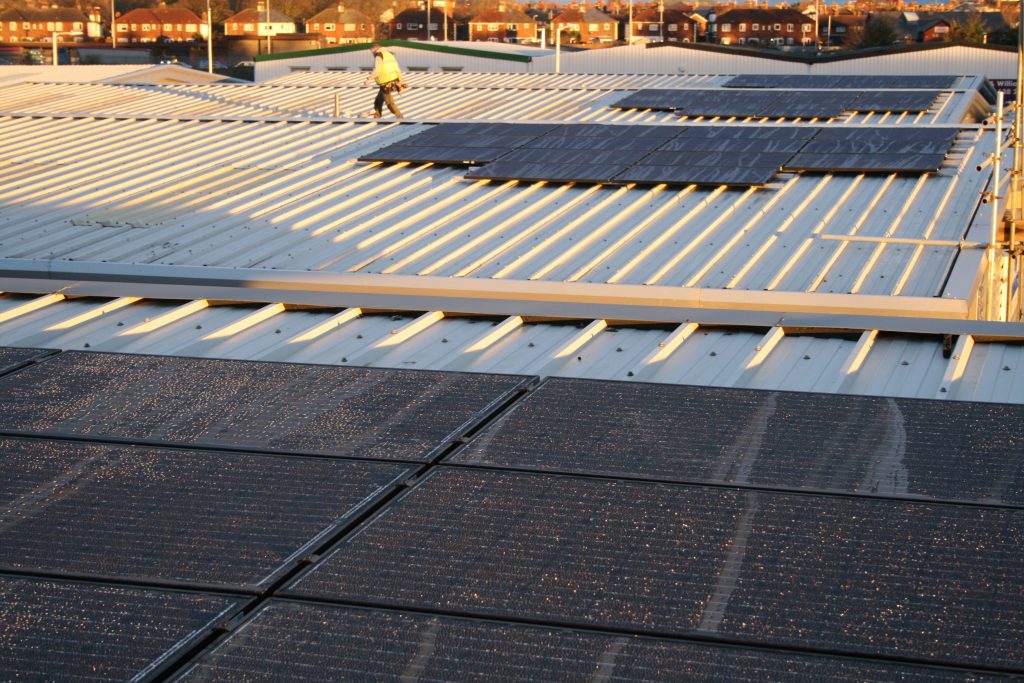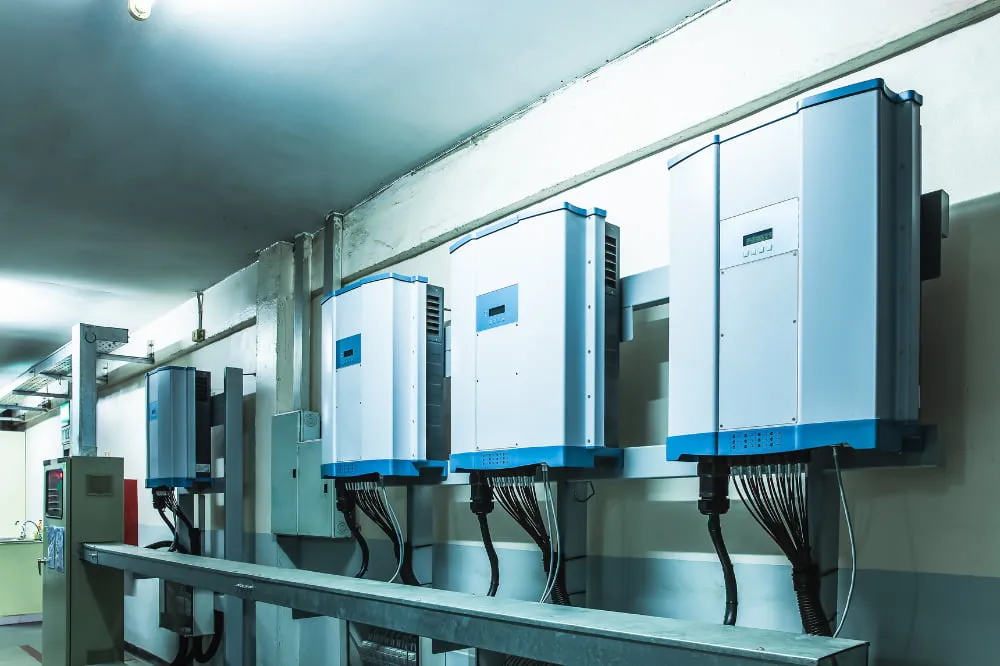Solar panels have become a cornerstone of energy efficiency strategies for Liverpool businesses, offering reduced operational costs and alignment with sustainability goals. However, relying solely on solar power leaves your commercial operation vulnerable during grid outages – a risk intensified by Liverpool’s exposure to coastal storms and ageing electrical infrastructure.
As the recent named storms have shown, 70, 80, and even 90 mph gusts can quickly lead to unplanned power disruptions. The recent increase in the frequency of these weather events means power cuts will likely remain a persistent problem for your business.
Manufacturing facilities, healthcare providers, and logistics hubs face significant financial and operational risks during outages, with a single hour of downtime costing small businesses an average of £800 and large commercial organisations £8,500. Even brief grid failures can result in spoiled inventory, missed deadlines, and contractual penalties for temperature-controlled storage facilities or production lines requiring uninterrupted power.
The solution is to pair solar panels with commercial battery storage systems, a combination that maintains power continuity during outages while maximising renewable energy usage. So, let’s examine how Liverpool businesses are leveraging this technology to future-proof their operations against grid instability.
Why Solar Panel Installations Alone Leave Liverpool Businesses Exposed
UK regulations require solar inverters to automatically disconnect from the grid during power cuts – a critical safety measure to protect utility workers repairing damaged lines. However, this mandatory shutdown leaves businesses in a precarious position: despite generating ample daylight energy, your solar panels become inactive precisely when you need them the most.
The gap lies in standard grid-tied solar systems lacking an Emergency Power Supply (EPS) function. This feature, distinct from basic solar battery storage, enables a controlled backup circuit to remain active during grid failures. Without EPS-equipped inverters and battery systems, even businesses with solar panels remain fully dependent on the grid’s reliability, which is a growing concern given Liverpool’s susceptibility to storm-related outages.
This dependency translates to tangible vulnerabilities for facilities like cold storage warehouses or data centres. A single outage could disrupt your temperature-sensitive inventory or critical server networks, eroding client trust and incurring costly recovery efforts. Solar panels alone, while valuable for daily energy savings, cannot mitigate these risks without integrated solar battery storage systems designed for seamless backup transitions.

How Solar Battery Storage Maintains Business Continuity
At its core, a commercial solar battery system functions as both an energy reservoir and an automatic failover mechanism. For Liverpool businesses, this means uninterrupted power during grid outages while maximising daytime solar investment. Here’s how it works in practice:
Core Components Designed for Reliability
Your system’s resilience begins with three integrated elements:
- Hybrid inverters: equipped with Emergency Power Supply (EPS) capabilities, which maintain a dedicated backup circuit independent of the grid.
- Lithium-ion battery banks: (10–200+kWh capacities) that store surplus solar energy for nighttime use or outages.
- Automatic transfer switches: that isolate your premises from the grid within milliseconds of detecting a fault, preventing dangerous back-feeding while activating battery power.
Unlike residential setups, commercial systems prioritise load management during outages. Critical circuits powering refrigeration, security systems, or production lines remain active, while non-essential loads are shed to extend backup duration.
Operational Modes Tailored to Liverpool’s Needs
Once installed, you can enjoy two separate operational modes to fit your specific needs.
Grid-Tied Operation
- Solar panels power daytime operations while charging batteries
- Excess energy exported to grid earns Smart Export Guarantee payments
- Intelligent software shifts non-urgent loads (e.g., EV charging) to solar peaks
Backup Mode Activation
- Automatically engages during grid failures, typically within 0.2 seconds
- Powers pre-selected critical loads for 4-24+ hours, depending on battery capacity
- Seamlessly returns to grid-tied mode once power stabilises
For Liverpool businesses, the inherent scalability ensures systems align precisely with your operational demands. Whether you manage a compact office in the Baltic Triangle or oversee a sprawling industrial facility in Speke, solar battery storage adapts to your unique requirements.
If your business relies on maintaining customer transactions and security systems during outages, a 10–30kWh system provides focused backup for essential loads like point-of-sale terminals and lighting.
Conversely, operations with high-value temperature-sensitive inventories (such as pharmaceuticals or perishable goods) benefit from modular 50-200kWh solutions that sustain refrigeration units and production lines through prolonged grid failures.
Key Benefits That Transform Your Liverpool Business
When you invest in solar battery storage, your business gains immediate protection against Merseyside’s increasingly unpredictable power landscape. Your operations continue seamlessly through grid failures – from essential lighting and IT infrastructure to temperature-sensitive storage and production equipment.
Beyond backup power, your combined solar panel and battery storage system actively reduces operational costs by storing excess solar energy for use during peak-rate periods. This stored power provides a reliable alternative to diesel generators, eliminating fuel costs and maintenance headaches while delivering cleaner, quieter backup power for your premises.
Your investment also strengthens your position as a sustainability leader in Liverpool’s business community. As the city drives towards its ambitious 2030 Net-Zero targets, your solar battery storage system demonstrates a genuine commitment to environmental stewardship. This enhances your competitive edge in tenders and builds lasting trust with clients who increasingly prioritise green credentials.
Choosing the Right Solar Battery System for Your Business
Selecting the appropriate solar battery system for your Liverpool business involves evaluating several key factors to ensure optimal performance and reliability. By carefully considering each aspect, you can make an informed decision that aligns with your operational needs and sustainability goals.
1. Analyse Your Energy Consumption Patterns
Understanding how your energy usage fluctuates between day and night is crucial. Assessing your daily power consumption helps determine the necessary storage capacity to maintain seamless operations regardless of the time of day. Consider the following:
- Daytime Usage: Identify periods of peak energy consumption during daylight hours.
- Nighttime Requirements: Determine the energy needed to support essential functions after dark.
- Seasonal Variations: Account for changes in energy usage across different seasons.
2. Assess Critical Load Requirements
Identifying which systems and equipment are vital for your business continuity ensures that critical operations remain uninterrupted during power outages. Focus on:
- Essential Equipment: HVAC systems, servers, refrigeration units, and manufacturing machinery.
- Backup Prioritisation: Decide which components require uninterrupted power to prevent significant disruptions.
- Future Expansion: Anticipate how your energy needs might evolve as your business grows.
3. Evaluate Roof Space and Structural Considerations
Liverpool’s diverse industrial architecture, ranging from historic Victorian warehouses to modern office buildings, presents unique opportunities and challenges for solar panel installation. Key considerations include:
- Available Roof Space: Measure the area available for solar panels to maximise energy capture.
- Structural Integrity: Ensure your roof can support the weight of the solar equipment.
- Orientation and Shading: Assess the optimal placement to maximise sunlight exposure and minimise shading issues.
4. Partner with Accredited Installation Professionals
Choosing experienced and accredited installers is vital for a successful solar battery system installation. Look for partners who understand Liverpool’s specific building regulations and heritage considerations. Key attributes of a reliable installer include:
- Accreditations: MCS and NICEIC certifications ensure quality and compliance.
- Local Expertise: Familiarity with Merseyside’s building styles and planning requirements.
- Comprehensive Support: From initial assessment to post-installation maintenance.
By balancing detailed assessments with professional guidance, you can ensure that your solar battery system is tailored to meet your business’s unique needs, providing both operational resilience and a sustainable energy solution.
Secure Your Liverpool Business’s Energy Future Today
Investing in commercial solar battery storage is a strategic move that safeguards your Liverpool business against unexpected power outages and enhances your sustainability profile. You can also achieve significant cost savings and demonstrate a strong commitment to environmental stewardship by ensuring uninterrupted operations and reducing reliance on the grid.
So, don’t let the next power cut disrupt your operations. Take advantage of one of our free consultations and site surveys to discover how our tailored Liverpool commercial solar battery storage solutions can meet your specific needs. Our team of experts is ready to provide comprehensive renewable energy solutions that ensure your business remains operational no matter the circumstances.
Contact us today at 0151 649 8350 or via email at info@applegarth.co.uk to secure a reliable and sustainable energy future for your business.








